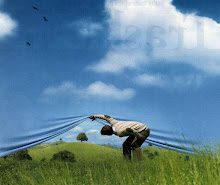 n] –noun
n] –noun | 1. | an act of bidding farewell or taking leave. |
| 2. | an utterance, oration, or the like, given in bidding farewell or taking leave; valedictory. |
~~~~~~~
Here we go. Through the course of this class, I do believe I've been inculcated with several important tenets of meta, normative and applied ethics. Innumerable key concepts have been elucidated for me, in a manner neither spurious nor reeking of tarradiddle. Thankfully, unlike some teachers, Professor Johnson did not engage in histrionics to get his point across, and instead approached the class like a deipnosophist, with the room being the table. The class grew in me a predilection for stimulating conversation, and I would sing my paean each day I returned from class to empty my brain onto a blog entry. Yet never was my curiosity slaked--each topic retained extant questions, from which truth awaited, and some were eventually stentorian and clear in their answers. I had my share of bouleversements, and treated my blog, whether I was writing in it or not, as a vade mecum, in which I could trust to lay out what information I had collected and attempt to interpret it.
The class never demanded us to be myrmidons, and hopefully indirectly convinced us not to be sybarites. I may not be a polyglot, but I tried to understand every word. As a person who often vacillates in decisions, the class was an aid to my confidence in moral choices, affirming merely through its persistence in discussing various topics. We parsed what we could with as much perspicacity as could be mustered, and even where we couldn't, abandoned sciolicisms in favored of continued consideration. We traduced none, thoughtfully contemplated our hirsute nonhumans and attempted magnanimity in our observations. Now that it's over, I'm restive and even more curious. This class was never somniferous to me.
~~~~~~~
Well, I must say this has been a very engaging class. The format is probably the most efficacious I've encountered, particularly with the emphasis on personal reflection (as should be the major foundation for all courses, but philosophy in particular). I am grateful for the classroom discussions, hopeful that I didn't make too many unnecessary comments, and look forward to future philosophy classes, hopefully continuing this broader sense of understanding I've always been seeking, but, it seems, always just now finding. Hopefully I'll be right on the verge of some great epiphany for the rest of my life. Onward and upward.

